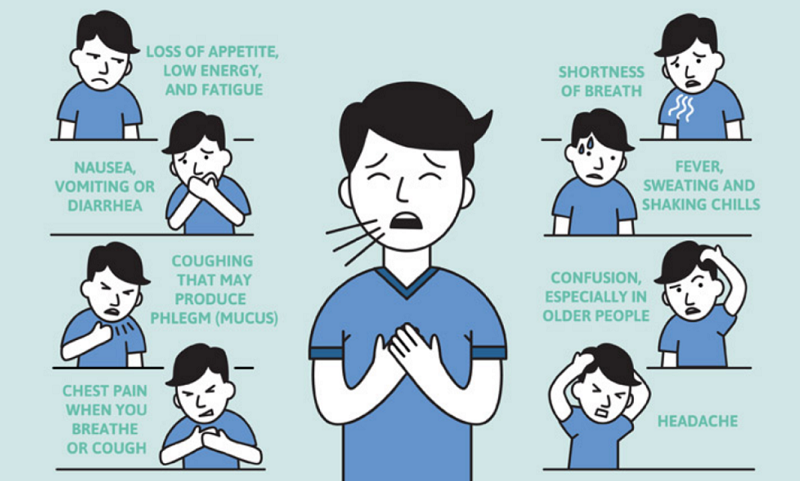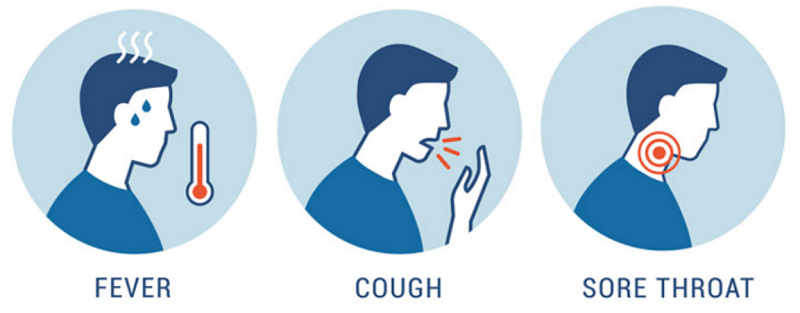So what exactly is pneumonia and when should you visit the hospital? Read on to identify the symptoms and discover why you should always seek medical help.
What is Pneumonia?
Pneumonia is a potentially life-threatening condition that causes the air sacs in the lungs to become filled with pus or fluid. It is caused by many pathogens, of which Streptococcus Pneumoniae is the most common. Other pathogens include viruses which can cause influenza. These infections are usually treated with antiviral medications or antibiotics, sometimes in combination.
How can I tell that I have pneumonia and not a cold or the flu?
As pneumonia is a lung infection, symptoms will relate to the respiratory tract and breathing difficulties will be experienced. This will be accompanied by a fever, body chills, and a cough that may produce blood-tinged phlegm. Some patients may experience pain in the chest upon deep breathing. With the flu, you may experience a headache and body aches that will come on suddenly. Pneumonia can develop from the flu.
Symptoms of pneumonia

When you have pneumonia, you may experience some, but not necessarily all of the following symptoms:
– Fever (38 degrees Celsius or higher)
– Chills
– Diarrhoea
– Difficulty breathing
– Coughing
– Decreased appetite
– Extreme fatigue
– Inability to walk a few steps without getting breathless
– Bluish fingernails and lips
– Pain when breathing deeply
– Quick heartbeat and breathing
– Sweating
– Yellow, greenish or bloody mucus when you cough
– Increased lethargy or sleepiness, and urinary incontinence in the elderly
Additional symptoms to note for children
– Laboured and rapid breathing
– Wheezing
– Fussiness
– Paleness
– Limpness and lethargy
– Crying more than usual
– Feeding poorly or vomiting
– Irritability
– Restlessness
– Flushed skin
Who is at risk for pneumonia?
Children and the elderly have a higher risk of developing pneumonia. Especially if they:
– Are below 5 years of age or above 65 years of age
– Have had a recent respiratory infection, or recent surgery
– Have swallowing difficulties
– Smoke
– Have any of the following conditions:
- – Asthma
- – Bronchiectasis
- – Cerebral palsy
- – Chronic obstructive pulmonary disease (COPD)
- – Cystic fibrosis
- – Decreased brain function
- – Diabetes
- – Heart disease
- – Liver cirrhosis
- – Weakened immune system
- – Chronic kidney disease on regular dialysis
Causes of pneumonia
Pneumonia can be acquired outside of a healthcare setting, even if you may be healthy, and this is known as community-acquired pneumonia. Community-acquired pneumonia can happen through the following ways:
Through a virus – Viral Pneumonia is a mild type of pneumonia. It is most commonly acquired by infants under the age of two following a cold, influenza, or Respiratory Syncytial Virus (RSV). Viral Pneumonia can become serious if left untreated.
From bacteria – Bacterial pneumonia can occur on its own, or after you have been sick with another illness. It can be caused by different types of bacteria and typically affects one lobe of the lung.
From fungi – Fungal Pneumonia can be acquired by breathing in fungal organisms. Common examples include bird droppings or soil containing fungi. People with a weakened immune system are most susceptible.
Through aspiration – Aspiration pneumonia can develop if you inhale saliva, vomit, food, or drink into your lungs either by accident or as a result of a brain injury, illness, or during abuse of drugs or alcohol.
Healthcare-acquired and Hospital-acquired Pneumonia
Pneumonia can also be acquired in a healthcare or hospital setting and is known as healthcare-acquired and hospital-acquired pneumonia respectively.
Healthcare-acquired Pneumonia is caused by bacteria present in outpatient clinics or long-term care facilities and can be difficult to treat as such bacteria is often resistant to antibiotics.
Hospital-acquired Pneumonia can develop during a hospital stay while being treated for another condition. Again, being resistant to treatment, this type of pneumonia is difficult to treat.
How is the COVID-19 novel coronavirus related to pneumonia?
The novel coronavirus COVID-19, first called 2019-nCoV that originated from Wuhan, China, is a relatively new virus. Presently, there is a lack of data on the behaviour of this new strain, and the community is racing against time to learn more about it. Health authorities have established that this virus can be passed from human to human.
Common symptoms of the COVID-19 novel coronavirus

– Fever
– Cough
– Sore throat
When the disease progresses, the patient is also likely to develop pneumonia and start experiencing breathlessness.
Protect yourself from the COVID-19 novel coronavirus
Members of the public are advised to do the following:
– Practise good personal hygiene, such as wash your hands frequently with soap
– If you have a fever, cough or runny nose, wear a surgical mask and seek medical treatment
– Avoid non-essential travel to mainland China
– If you are travelling to mainland China, avoid direct contact with live animals including poultry and birds, and refrain from consuming raw and undercooked meats
When to see a doctor
While you can recover from a cold on your own, pneumonia requires medical treatment because it is a lung infection that can turn deadly. Should you suspect pneumonia, see a doctor right away for an accurate diagnosis and timely treatment. The earlier pneumonia is diagnosed, the easier it is to treat.
When to go to the A&E
Seek treatment immediately at the nearest Accident & Emergency (A&E) department if you notice the following symptoms: a high fever, inability to keep food down, experiencing breathing issues, acting confused or delirious, or coughing up blood. These are serious complications of pneumonia and have to be attended to immediately, especially if the sufferers are children or elderly.
Those who suspect they may have contracted the COVID-19 novel coronavirus should visit the nearest A&E department for medical attention.
Want to be healthier? Getting support from a dietitian can help you kickstart a sustainable healthy eating plan and transform your lifestyle.
This article is sponsored by Parkway Shenton, Mount Elizabeth and reviewed by Dr Steve Yang, respiratory physician at Mount Elizabeth Hospital.
Information in the article will get updated as MOH releases further advisories on this topic
Exclusive for SCB MyWay clients: Access to 24/7 medical concierge service by Parkway Hospitals. Secure your appointment today at our dedicated SCB Medical Concierge Service at +65 6812-3780. Enjoy discounted health screening package simply by flashing the Standard Chartered MyWay debit card. Please visit sc.com/sg/MyWay for the full terms and conditions that apply.
References
The Difference between Pneumonia and the Flu. Retrieved 22/01/2020 from https://www.piedmont.org/living-better/the-difference-between-pneumonia-and-the-flu
Do I Have Pneumonia? Retrieved 22/01/2020 from https://www.webmd.com/lung/understanding-pneumonia-symptoms
Pneumonia- Causes, Symptoms, ER Treatment. Retrieved 22/01/2020 from https://ercare24.com/pneumonia/
What is the Wuhan coronavirus? Retrieved 22/01/2020 from https://www.gov.sg/article/what-is-the-wuhan-coronavirus



